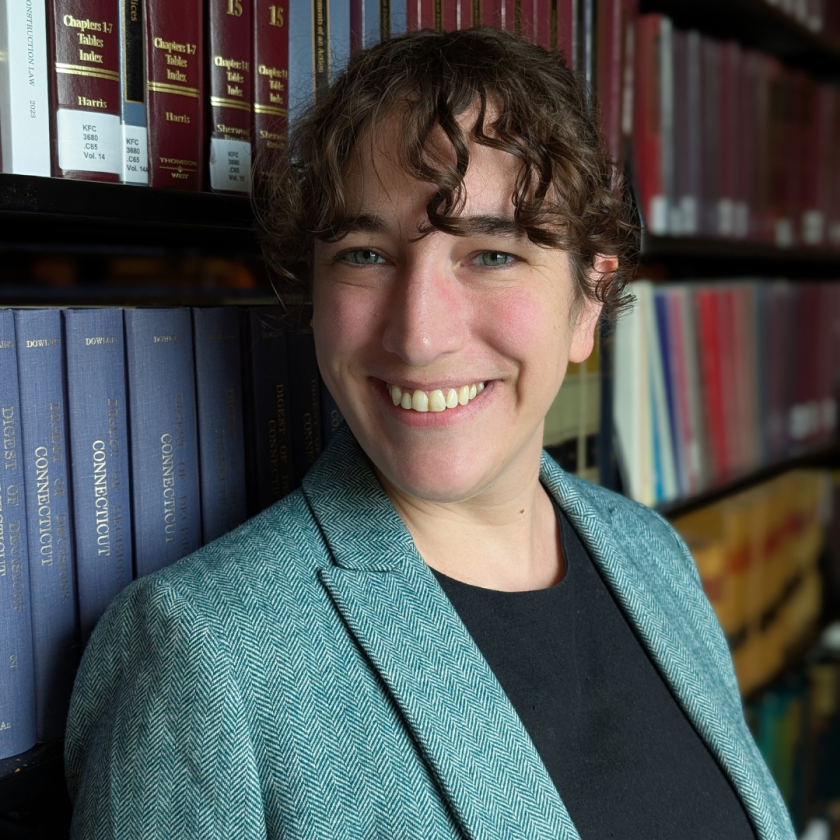
As a law librarian II for the State of Connecticut Judicial Branch, Rebecca Greenlee (MSLIS '21) helps patrons from all walks of life gain access to the law. She credits her graduate assistantship, the connections she made with her classmates, and the iSchool’s instructors with providing her with the foundation she needed for her role.
Where do you work, and what is your role?
I work as a law librarian II for the State of Connecticut Judicial Branch. I manage and run the law library at the Danbury Superior Courthouse as a solo librarian, in addition to working with my colleagues on projects such as responding to reference requests from patrons who are incarcerated, preparing research resources for patrons, and answering reference questions in person, via telephone and email, or through our remote reference services. I manage my library's budget, collection development, archival materials, and all other aspects of running the library.
What do you like best about your job?
My favorite part of this job is helping patrons from all walks of life by increasing their knowledge of the law. I work with judges, attorneys, courthouse staff, self-represented patrons, members of the public, incarcerated folks, and, yes, even school tours visiting the library. One of the most rewarding things has been curating a space and environment where people who are facing some of the scariest events of their lives can come to feel comfortable, understood, and empowered with knowledge and resources. People who come to the courthouse are not having fun—they are generally scared and apprehensive, and I treasure each opportunity I get to make a positive impact on the lives of every patron whom I assist.
What do you see as the most critical impact of your work?
The most critical impact is really increasing access to the law, especially for people who are incarcerated. In the United States, access to government law libraries varies greatly from state to state, and I have been fortunate enough to begin my career as a government law librarian in a state where I am afforded opportunities to serve people who are incarcerated. I am proud to be co-chair for the American Association of Law Libraries' Social Responsibilities' Committee on Law Libraries Serving People who are Incarcerated, where I am helping build a nationwide network of law libraries and resources for people who are incarcerated.
One of the biggest hurdles facing folks who are not attorneys and cannot afford attorneys is a lack of legal knowledge. I work with patrons of varying levels of education, technological literacy, and comfort with reading. I navigate those reference interviews by tailoring my language, explanations, and overall approach to the specific information behavior needs of my patrons. I provide space for people to ground themselves, for them to feel empowered by knowing how to conduct their own research, and to ensure equitable access to the law.
How did the iSchool at Illinois help you get to where you are today?
My time at the iSchool was profoundly formative. Three specific parts of my experience during my time there gave me a significant head start on my career. First, I worked as the graduate assistant for the Office of Advancement and Alumni Affairs, where I was given a great deal of opportunity to learn how to make lasting connections with alumni around the country who are doing the work I wanted to do. Being a law librarian is already a specialized career choice, but being a government law librarian is even more niche, and it’s hard to find folks in those jobs to connect with. Working under Jill Gengler, the former director of advancement and alumni affairs, opened up my world in a way that no career fair possibly could have, because government law libraries aren't necessarily present at those events. The second formative experience was forming connections with my cohort that last to this day. It's important to stay in touch with your library school friends—I'd say especially if they choose a different specialization in the field. Finally, the third formative portion was not just the classes but the instructors. I took Information Behavior with Melissa Ocepek and Prison Librarianship with Jeanie Austin, among other classes. These instructors and the lessons from these classes have shaped my approach to being a librarian and my conceptualization of my duty to help my country as a librarian.
What advice would you like to share with iSchool students?
Join the organizations (and I don't mean just the student chapters) and go to the conferences. Go to ALA. Go to SLA. Go to PLA. Go to every conference you possibly can—if you can't afford it, or need assistance attending in some way, ask. I found out about my current position by networking at ALA in 2023, where I met a mentor who encouraged me to apply, even though I didn't think I was qualified (I was very qualified).
If you have a question or need help, ask. The worst that will happen is you will be told no. Always make the inquiry, and don’t shy away from being honest and vulnerable. A key aspect of librarianship is maintaining curiosity, and I encourage applying that curiosity to all aspects of your life.
Treasure the experience of being on an enormous campus. Go places. Go for a walk around the Japan House or Meadowbrook. Take pictures of the sunset over the prairie. Go to protests (but leave your phone at home).
What do you enjoy doing in your spare time?
I spend my spare time taking care of my perfect, flawless, and magical dog, Molly Ivins Greenlee, driving around the beautiful hills of western Connecticut, and longing for a Culver's Deluxe or a frozen custard from Jarling's.